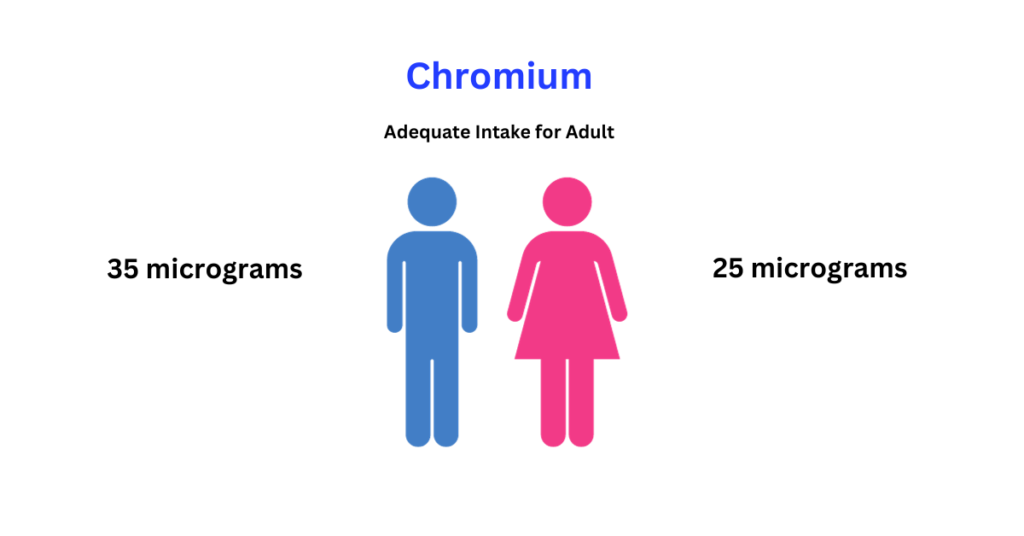Chromium is a trace mineral essential to glucose metabolism and insulin sensitivity, underscoring its importance in daily intake. Recognizing the benefits of chromium and incorporating chromium-rich foods into meals helps maintain balanced nutrient levels and supports overall health.
Meeting the Recommended Daily Dose of Chromium
Adequate chromium intake contributes to several bodily functions, especially macronutrient metabolism. As there is no established Recommended Dietary Allowance (RDA) for chromium, health authorities have set an Adequate Intake (AI) level. The AI is sufficient to meet the nutritional needs of the vast majority of the population. For adults, the AI for chromium ranges from 20-35 micrograms per day.

Food Sources
Dietary chromium is found in various foods, contributing to your daily intake. To boost your chromium levels through diet, focus on chromium-rich foods such as:
- Broccoli (1/2 cup, cooked): Approximately 11 micrograms
- Whole wheat bread (2 slices): Approximately 4-6 micrograms
- Potatoes (1 medium, cooked with skin): Approximately 2 micrograms
- Green beans (1/2 cup, cooked): Approximately 1-2 micrograms
- Beef (3 ounces, cooked): Approximately 2-3 micrograms
- Turkey (3 ounces, cooked): Approximately 2-3 micrograms
- Eggs (1 large): Approximately 3 micrograms
- Apples (1 medium): Approximately 1 microgram
- Grapes (1 cup): Approximately 3 micrograms
- Brewer’s yeast (1 tablespoon): Approximately 11 micrograms
While chromium is found in various foods, it is often present in modest amounts, making it challenging to obtain sufficient levels through diet alone.
Deficiencies and Supplementation
Individuals unable to meet their chromium needs through diet alone may be recommended chromium supplements by healthcare providers. Studies have indicated potential benefits of chromium supplementation, especially for those with conditions that affect glucose metabolism.
However, chromium supplementation should be approached with guidance from a healthcare professional to ensure proper dosage and prevent potential adverse interactions.
Interactions and Absorption
Dietary factors can influence chromium absorption. For example, it may be better absorbed from animal than plant sources. Chromium supplements are available in various forms, including chromium picolinate and polynicotinate. It’s important to follow healthcare provider recommendations for supplement use to avoid excessive intake. Chromium plays a role in insulin function and may contribute to glucose regulation.
Additional Benefits of Chromium
Aside from its role in glucose metabolism, chromium also offers other health benefits. These include:
- Improved lipid profile: Studies have shown that chromium supplementation can help lower total cholesterol and LDL (bad) cholesterol levels while increasing HDL (good) cholesterol.
- Weight management: Chromium has been linked to improved insulin sensitivity, which can promote weight loss and help maintain a healthy body mass index (BMI).
- Boosted brain function: Chromium produces acetylcholine, a vital neurotransmitter in memory and cognitive function.
With these added benefits, it’s clear that incorporating chromium into your diet can have a positive impact on overall health. So, next time you plan your meals, include some chromium-rich foods for a well-rounded nutrient intake.
Conclusion
The chromium benefits are significant, particularly regarding blood sugar control and metabolic health. A balanced intake of various chromium-rich foods, including chromium supplements when necessary, contributes to healthy glucose regulation and overall well-being. Please remember to consult a healthcare professional to determine the appropriate recommended daily dose of chromium for your health needs when incorporating supplements into your routine.







